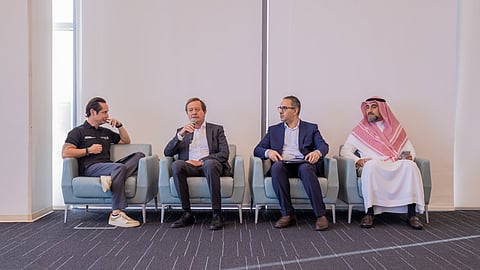KAUST, HEFARI and NEOM Join Forces to Accelerate the Hydrogen Economy in Saudi Arabia
A powerful partnership to support Saudi Arabia’s hydrogen economy has formed between King Abdullah University of Science and Technology (KAUST), NEOM’s Education, Research, and Innovation Foundation (ERIF) and ENOWA.
NEOM’s ERIF has sponsored three strategic projects under its Hydrogen and e-Fuels Applied Research Institute (HEFARI) with KAUST researchers on developing hydrogen as a renewable energy vector.
Progress on these projects was presented at a recent summit held at KAUST’s Research and Technology Park.
The two-day summit saw senior representatives from KAUST, ERIF, HEFARI, ENOWA, Imperial, Saudi Aramco, HyET, Cruise Saudi, Nxt7, and Dow meet to discuss progress, challenges, and opportunities for developing the Kingdom’s green hydrogen economy.
Expert perspectives were shared on the cost-effective production of green hydrogen and ammonia and their deployment across important use cases such as sustainable fuels for aviation and marine propulsion.
Electrolyser development, including improved catalysts and membranes, and manufacturing requirements were discussed, as were also transportation and storage requirements.
The three projects sponsored by ERIF (HEFARI) at KAUST are led by:
Professor of Mechanical Engineering William Roberts, who is working on carbon-neutral fuels for marine engines, in response to new regulations to decarbonize maritime transport
Professor of Chemical Engineering Mani Sarathy, who is working on lowering the cost of large-scale electrolyzer technologies for cleaner hydrogen production
Assistant Professor of Mechanical Engineering Thibault Guiberti, who is working on lowering the undesirable emissions from engines and turbines that use green ammonia as a fuel
Donal Bradley, Executive Director of NEOM’s Education, Research & Innovation Foundation (ERIF), commented on the partnership: “HEFARI is a key component of the NEOM R&I ecosystem helping to advance the Kingdom’s green hydrogen economy.
"The alliance of ENOWA and ERIF with KAUST will help to make Saudi Arabia a formidable force in developing new technologies and processes for efficient hydrogen generation, storage and conversion into sustainable fuels."
KAUST Vice President of Research Pierre Magistretti, welcomes the funding and notes that the university is a leader in hydrogen research: “This partnership with ENOWA and NEOM’s Research Institute is well positioned within the context of the new Center of Excellence (CoE) on Renewables and Energy Storage which will also have hydrogen related research activities.
"This CoE was established along with three others on Smart Health, Food and Generative AI in the context of the new Strategic Plan and reorganization of KAUST research to accelerate impact.
"There is growing hydrogen research expertise and projects at KAUST from hydrogen production, storage, transport, and utilization."
Roland Kaeppner, Managing Director of Hydrogen and Green Fuels at ENOWA commented: “Working with NEOM’s ERI and KAUST is a natural progression for ENOWA.
"We already have the world’s largest green hydrogen production facility and offering our Hydrogen Innovation Development Center (HIDC) to KAUST and NEOM’s HEFARI means the Kingdom can continue to lead in hydrogen research.”
Ben Queisser, Head of Technology and Innovation, Hydrogen and Green Fuels (ENOWA), commented: “The HIDC will not only support KAUST research but also the development of decarbonized synthetic fuels in collaboration with Saudi Aramco.
"It will also house a 20 MW electrolyzer from thyssenkrupp nucera, which will contribute to the world’s largest green hydrogen and ammonia plant operated by NEOM Green Hydrogen Company (NGHC).”
Saudi Arabia aims to produce 50% of its electricity from renewable energy by 2030. At the same time, it wants to become the top producer and supplier of hydrogen in the world.
Through its circular carbon economy framework, Saudi Arabia has pledged to reach net-zero carbon emissions by 2060. For these reasons, Saudi Arabia’s plans for hydrogen production from renewables (i.e., green hydrogen) are rapidly evolving.


